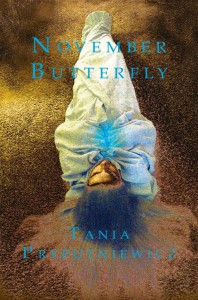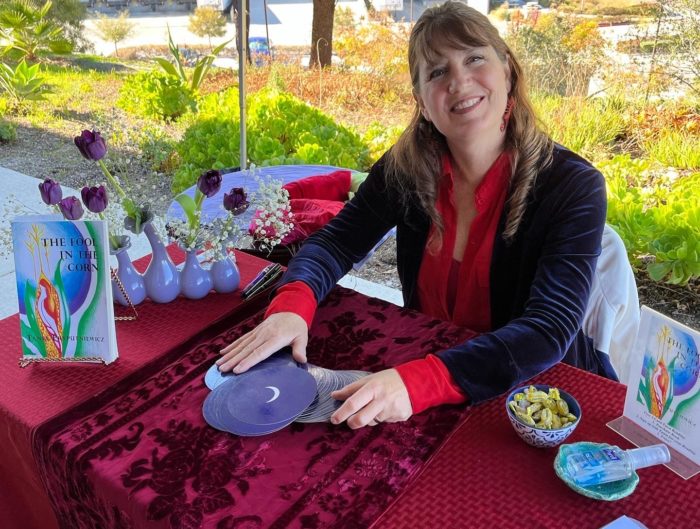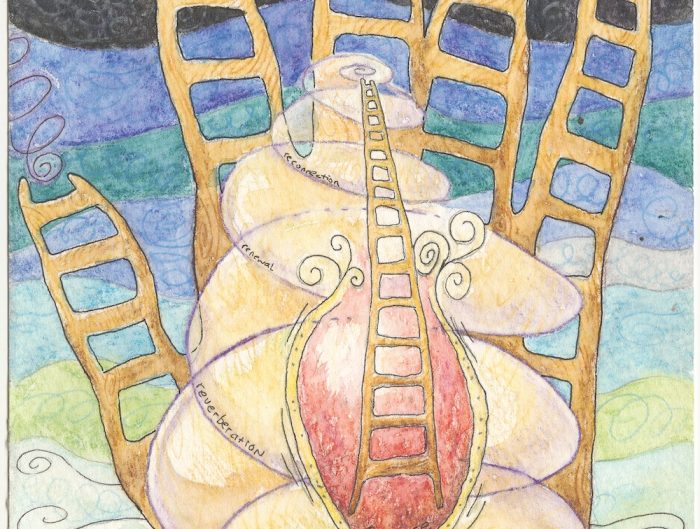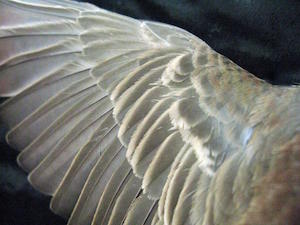November Butterfly Book Launch, Movie Screening, Art Show and Book Signing will be hosted by the Occidental Center for the Arts this Sunday March 29th from 3-5 pm. OCA is located at 3850 Doris Murphy Court, at the corner of Bohemian Hwy and Graton Rd. and is wheelchair accessible. For more info, call 707-874-9392
November Butterfly was published in November of 2014 by Saddle Road Press.
(Cover photo by Robyn Beattie. Cover Design, Don Mitchell, Saddle Road Press.)
THE POETRY MOVIES and ART
The afternoon features a poetry reading based on the poems in November Butterfly and accompanying poetry movie screenings for Mordred’s Dream (originally published by Poetry Flash), Corridor, Thumbelina (originally published by the NonBinary Review / Zoetic Press and a finalist for Sundress Publication’s Best of the Net Award in the category of poetry) and Amelia (awarded Juror’s Best of Show at the 2012 2D/3D visual poetry show held at the LH Horton Jr Gallery at San Joaquin Delta College). On display at the event will be over a dozen of the the actual works of art featured in the four 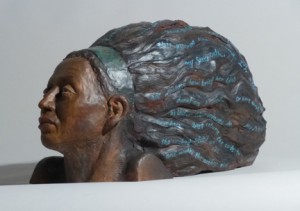 movies by Sonoma County artists Genevieve Barnhart (bronze sculptures), Loreen Barry (mixed media), Paul Beattie (ink print), Robyn Beattie (photography, including image of artwork by Christiane Vincent), Chris Boyd, Sandy Frank (ceramic sculpture–pictured here), Barbara Hoffmann (ceramics), Orion James (ceramics), Monty Monty (assemblage sculpture), and Ron Rodgers (bronze sculpture).
movies by Sonoma County artists Genevieve Barnhart (bronze sculptures), Loreen Barry (mixed media), Paul Beattie (ink print), Robyn Beattie (photography, including image of artwork by Christiane Vincent), Chris Boyd, Sandy Frank (ceramic sculpture–pictured here), Barbara Hoffmann (ceramics), Orion James (ceramics), Monty Monty (assemblage sculpture), and Ron Rodgers (bronze sculpture).
THE MUSICIANS
Sonoma County musicians Michael Greenberg (guitar), Lori O’Hara (flute) and Stephen Pryputniewicz (piano) provided the music behind the poetry movies as well as sound recording, editing, and studio support. Lori’OHara loaned her voice to Amelia and Ben Greenberg loaned his to Mordred’s Dream.
 Stephen Pryputniewicz will be playing piano live for the event.
Stephen Pryputniewicz will be playing piano live for the event.
The event is free though donations accepted. Books, artwork, and refreshments will be available for sale.
SHORT RADIO INTERVIEW about the Event on KRCB:
Sonoma Spotlight with Roland Jacopetti
REVIEWS of November Butterfly:
The Mom Egg, by Anne Marie Fowler
In this lush exploration, Pryputniewicz observes the lives of numerous iconic women—women who navigate the world with impeccable courage and daring. It is through these observations that the speaker reveals her own struggles, as though she were dancing with the looking glass.–Anne Marie Fowler
Damfino Press, by Lauren Gordon
James Joyce once wrote that lyrical poetry is ‘the form wherein the artist presents his image in immediate relation to himself’ and Pryputniewicz’s persona poems are exemplary of this. She experiments with voice through the motif of the female experience and the effect is a feminist reimagining and projection. Characters like Sylvia Plath, Lady Di and Ophelia become mythological archetypes via Pryputniewicz’s deft rendering. –Lauren Gordon
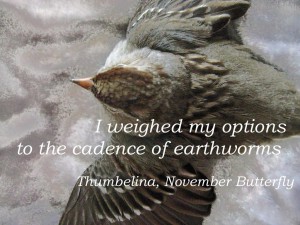 The California Journal of Women Writers, by Jen Teeter-Moore
The California Journal of Women Writers, by Jen Teeter-Moore
Pryputniewicz’ Guinevere is opinionated and strong compared to Marilyn and is a direct contrast to the helpless heroine she is in medieval poetry.—Jen Teeter-Moore
ADVANCE PRAISE FOR November Butterfly:
Tania Pryputniewicz has captured, with exquisite timing, eye and taste, the iconic power of our great archetypes, be they ancient or contemporary. Time spent with her work is always enriching.
—Persia Woolley, author of The Guinevere Trilogy
In November Butterfly, the lyrical I looks into the mirror to find a different face with each pass. In this way, Pryputniewicz maintains the intimacy of the poetic I while expanding the personal lyric to a global resonance. As Ophelia, Jeanne d’Arc, Nefertiti, Amelia, Lady Diana, Marilyn and Sylvia come to reflect, we too find ourselves dissolving into the mirror…. Pryputniewicz threads the narratives of multitudes into the singular I; with her gift of deep empathy, imagination, and lyricism, she gives readers the chance to live again and again and again.
—Nicelle Davis, author of Becoming Judas
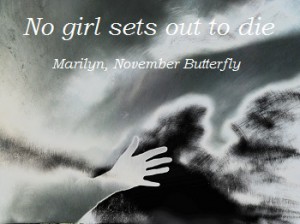 Reading, we enter a world in which Guinevere loves and does not love; we glimpse her as a girl wearing “pale slippers like falcon hoods, / so lethal, so light.” Later, she is a woman, shimmering, conflicted, drawn to a great, obliterating love…. What does it mean to love, deeply, passionately, and in ways that will make it impossible to return to the life one was living before? What does it mean to link the great streaming magic of the everyday—to a real day? Divination and sacrifice offer us a way through. Pryputniewicz does not flinch from the challenges of the labyrinth—pathways that might lead equally, or randomly, to betrayal or desire. “So easy to muck the translation,” she writes, “no common language— that gap between the self one loves and the self one fears.” Her book gives us some courage—as we read and breathe that gap—to return what we find there to our own shattered and shattering, quotidian and startling lives.
Reading, we enter a world in which Guinevere loves and does not love; we glimpse her as a girl wearing “pale slippers like falcon hoods, / so lethal, so light.” Later, she is a woman, shimmering, conflicted, drawn to a great, obliterating love…. What does it mean to love, deeply, passionately, and in ways that will make it impossible to return to the life one was living before? What does it mean to link the great streaming magic of the everyday—to a real day? Divination and sacrifice offer us a way through. Pryputniewicz does not flinch from the challenges of the labyrinth—pathways that might lead equally, or randomly, to betrayal or desire. “So easy to muck the translation,” she writes, “no common language— that gap between the self one loves and the self one fears.” Her book gives us some courage—as we read and breathe that gap—to return what we find there to our own shattered and shattering, quotidian and startling lives.
—Bhanu Kapil, author of The Vertical Interrogation of Strangers

